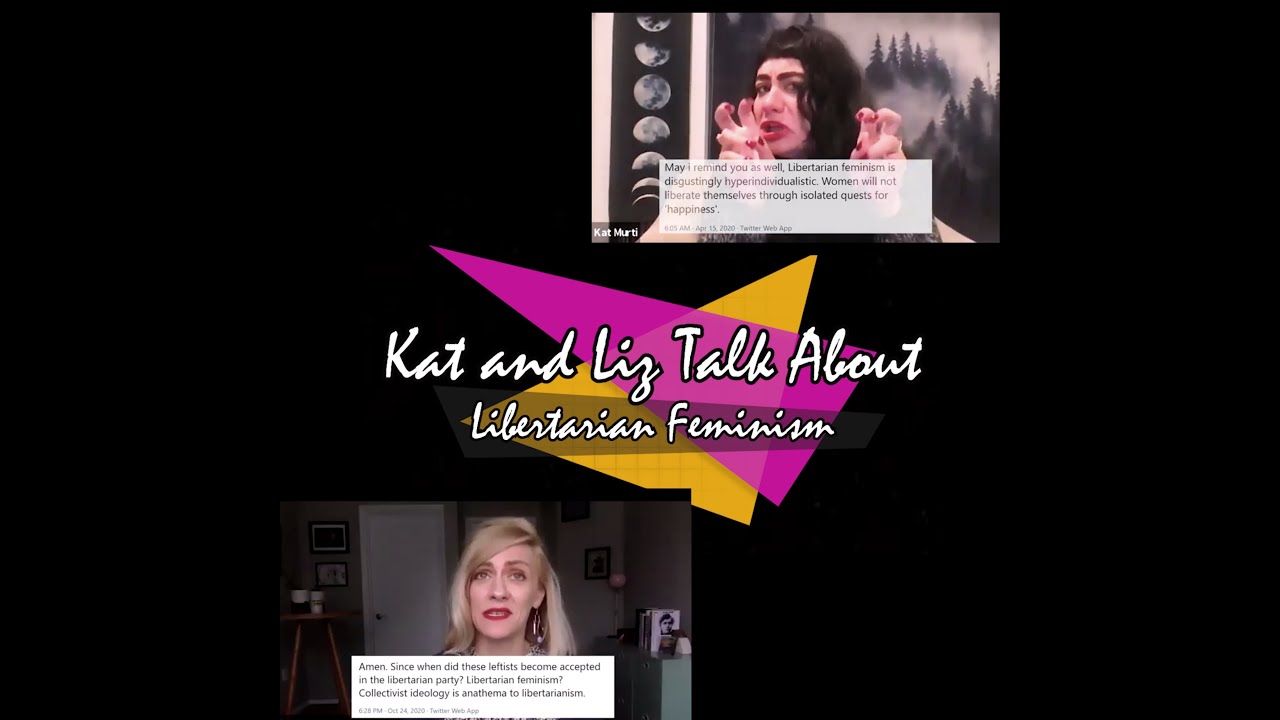Welcome to Kat and Liz Talk About…, a video series featuring Feminists for Liberty’s Kat Murti and Elizabeth Nolan Brown.
So, today we’re talking about libertarian feminism—or as some people are clearly convinced, the radical commie plot to take over libertarianism. In our second episode, we share some disparaging tweets sent to the @FeministLiberty account and discuss common misconceptions about libertarian feminism, the all-too-common erasure of libertarian feminists by both the right and the left, and why libertarianism is inherently feminist.
Alright, so: spoiler—we aren’t socialists, or communists, collectivists, Marxists, Democrats, leftists, or whatever else people like to tweet at us. We aren’t even left-libertarians, though that’s a label we frequently get—both as a compliment and as an insult. When it comes to libertarian philosophy or policy proposals, you will, for better or worse, generally find both of us pretty squarely within the mainstream of centrist libertarian thought. But what we do aim to do with Feminists for Liberty is hone our essentially basic libertarian views on issues that haven’t historically gotten much attention in libertarian circles—or that did but have fallen by the wayside—surrounding the way the government treats women, sexuality, gender and things like that.
Interested in hearing more? Join the conversation on social with #KatAndLiz, follow us on YouTube, and stay tuned for more episodes soon!
Transcript:
Kat: [Reading tweet] “There’s no such thing as libertarian feminism, feminism is communism.”
Liz: [Reading tweet] “Libertarian feminism? Collectivist ideology is anathema to true libertarianism.”
Kat: [Reading Tweet] “How come it’s overwhelmingly men who are into libertarian feminism. That doesn’t sit right with me. “
Liz: Ugh, that one always gets me.
Kat: [Reading Tweet] “May I remind you as well? Libertarian feminism is disgustingly hyper individualistic. Women will not liberate themselves towards isolated quests for happiness.
Liz: [Reading Tweet] “LMAO. I can promise you libertarian feminist is not a thing.”
Kat: [Reading Tweet] “One could characterize libertarian feminism as a socialist attempt to co-opt and subvert libertarianism.”
Liz: Oh, no. Kat?
Kat: What?
Liz: [laughing] I think they’re onto us.
Kat: Okay. So today we’re here to talk to you about libertarian feminism—or as some people are clearly convinced the radical commie plot to take over libertarianism.
Liz: If that’s what we’re supposed to be doing, I think we’re doing this wrong.
Kat: Don’t worry. We’re actually here to tell people why libertarian feminism is not what they appear to think.
Liz: But is it socialist?
Kat: No.
Liz: But is it communist?
Kat: Also no.
Liz: Are you now, or have you ever, been a fan of AOC?
Kat: Okay. So I do like her lipstick and her stance on over-the-counter birth control and I’d love to abolish ICE…. But when it comes to things like economics or the role of the state, yeah, we don’t agree at all
Liz: Suspect! … I like her lipstick too, though.
Kat: So, spoiler, neither Liz nor I are socialists or communists, collectivists, Marxists, Democrats, leftists, or whatever else people like to tweet at us. We aren’t even left libertarians, though that’s a label we frequently get, both as a compliment and as an insult.
Liz (02:01): When it comes to libertarian philosophy or policy proposals, we are essentially for better or worse, pretty squarely within the mainstream of centrist, libertarian thought. But what we do aim to do with Feminists for Liberty is hone our essentially basic-AF libertarian views on issues that haven’t historically gotten a lot of play within libertarian circles—or maybe did but have fallen by the wayside— surrounding things like the way government treats women, sexuality, gender, and surrounding issues.
Kat (02:30): Libertarianism is inherently feminist, and it always has been Tony Nathan, one of the founders of the libertarian party and the first woman to win in the United States electoral college vote as the LPs 1972 vice presidential nominee went on to found the Association of Libertarian Feminists way back in 1973,
Liz (02:51): Their mission, like ours, was to inject a libertarian feminist perspective into contemporary political conversations and promote policies that advanced sex and gender equality while respecingt things like individual rights and free markets and civil liberties. They believed, like we do, that sex and gender should be irrelevant to how one is treated under the law, and that government could often be “women’s enemy” as Sharon Presley and Lynn Kinski wrote in 1976. That was around the time that the more anti-authoritarian and intersectional strain in US feminist politics was becoming more marginalized. So even as you have feminists pushing the idea that “feminism is simply the radical notion that women are people,” you had mainstream feminist groups more and more aligning with big government and the carceral state, and, you know, teaming up with conservatives on issues, and opposing women who made choices they didn’t like — whether that was, you know, being a housewife or being a sex worker or whatever — and sort of pushing out anyone who thought otherwise.
Kat: So if feminism is the radical notion that women are people, libertarian feminism is the even more radical notion that people of all genders are individuals and should be treated as such.
Liz: One question we get asked a lot though, is if libertarian is inherently feminist, why not just identify as libertarians? You know, why do we bother saying we’re libertarian feminists? Why bother founding a group like Feminists for Liberty?
Kat (04:07): I think it’s about scope and focus. So traditionally libertarianism hasn’t always prioritized or focused on a lot of the issues that mainstream feminists do as libertarian feminists. We share many of the same concerns that mainstream feminists have, but we believe that the best way of creating change in society isn’t based on coercion, criminalization, or censorship. And if we’re not there in those discussions, we’re sort of ceding ground for the people who support very non libertarian solutions to these problems, solutions that we generally don’t believe work, and that the evidence often bears out to be true.
Liz: We’re also ceding ground to people within the libertarian movement who want to promote this idea that doesn’t jive at all with, you know, libertarian history and the record that libertarianism is actually, inherently tied to social conservatism, that it inherently promotes things like the traditional family, that it promotes one lifestyle over another, and that’ it’s not just about government. And, you know, they say that feminism is the radical thing, but they’re actually pushing their own sort of social views too—and oftentimes you’ll hear them advocating for government force and that! So anyways, we want to counter that. And then also sort of.. There’s a lot of people online that call themselves libertarian and expound these really sort of horrible and sexist and misogynistic views sometimes. And so understandably, there’s this idea among non libertarians that libertarianism is some sort of gross boys’ club.
Kat: There’s this very dude bro-y kind of idea that you see — especially on social media, but it’s probably always kind of been there — that men are individuals and women are their property, which is obviously not at all, something that we would support
Liz: Very much two sides of the same coin almost too, in a lot of ways, the way liberal feminists talk about women and the way that the anti-feminist crowd does, because both are collectivizing women instead of treating women as individuals.
Kat: Yeah. So as libertarian feminists, we like to say that there’s really nothing more collectivist than treating someone as simply a representative of their sex or their gender.
Liz: We also like to say, ‘hi, we exist!”—because people are always asking us why aren’t there more women libertarians, or why aren’t there any women libertarians? And it’s like, I get it, but also … Hi, you know, there’s us, there are all these people out there who we’re working with every day. And so a lot of times people like to talk about how there are no female libertarians and they try to use it as a cudgel against libertarianism—feminists will sometimes do that, like mainstream feminists—and it’s so weird because it’s like, you’re just erasing the work of so many women who actually believe these things and are using their own agency to choose to work in this realm.
Kat (06:47): Yeah. And it can be really self-fulfilling too, like you, and I both know way more libertarian women that we can count, but then there’s this constant drum beat of libertarianism is for sexist old white men. And if libertarians or “libertarians” are responding by saying, well, women just don’t like liberty or treating the whole thing like a joke, then it tends to scare away a lot of really awesome freedom minded women who would otherwise be a lot more interested in libertarian ideas and open to them, you know?
Liz: Right, and I also think it turns people off because you’ll have this, you know, you’ll have some libertarians say that talking about things that they want to talk about—that a lot of men are interested in are—are just gender neutral. But then if you have women start to talk about issues, like, you know, government regulation of reproductive freedom or things like that, you know, it’s a lot of like, ‘Oh, why do you want to focus on women’s issues?’ And I mean, these aren’t just women’s issues, A, and also – why is the government treatment of women not a proper role for libertarianism? Like, that’s just as proper of a role for libertarian activism and inquiry as anything else, you know? But anyways, we’ve told you enough about what libertarian feminism isn’t. So at this point we should probably get to more about what it is
Kat: Feminists for Liberty is anti sexism and anti-statism, we’re pro markets and pro-choice — in everything.
Liz: We are classically liberal, anti carceral and sex positive,
Kat: And we believe that libertarianism is consent culture applied to everything.
Liz (08:24): Okay. So that’s us though. What about libertarian feminists in general? Well,
Kat: One thing that I think sets us apart from many other feminists is that we believe that gender equality is tied not just to social and cultural liberty, but to economic liberty as well. That markets generally speaking are a good thing. And that women’s increased access to markets and capitalism has been a huge contributing factor to the growth of women’s rights.
Liz: We are also way more wary of criminalization and prosecution or creating government committees and task forces to solve problems, not so much because they cost too much money— even though they do and that’s important—but also because there are things that governments should be spending the money on and instead of spending money on doing that the right way, they’re spending money, usually on these things that sort of invade everyone’s civil liberties and often I end up—as in the war on sex work, for one instance—really harming the people that they’re claiming to help, by perpetuating this system where we’re just using police to solve all of our social problems.
Kat (09:25): Right. So historically the state has been one of the largest perpetrators of sex discrimination, gender oppression, and sexual violence. And you can’t just overlook that history and expect the government based solutions are going to benefit women or sex and gender minorities when they’ve overwhelmingly worsened, existing problems caused by sexism and patriarchy.
Liz: Government is also very slow and laws and regulations tend to cement us into a certain time, while culture can be easier to change.
Kat: And even the best intention laws are still subject to cultural whims. And if you don’t address the culture, the impacts end up not being what was intended.
Liz: This is where a lot of libertarians kind of lose the thread. If the problem isn’t specifically in government, then aren’t we just talking about people’s choices?
Kat (10:17): A lot of times, it is about choice. And that’s a good thing. As libertarian feminists, we don’t want to dictate to anyone how they should live or what decisions are right for them. But we also want to take into account why people make the choices that they do and if it’s truly is a choice for them. ,
Liz: Women obviously face discrimination and other obstacles that are not just related to government policy
Kat: As libertarians, we believe in making cultural change in the marketplace of ideas, not using state or other force to try to compel people to live in a certain way or make certain choices. And basically we apply those same ideas to our feminism.
Liz: One of the beautiful things about a system in which the state doesn’t lord over all facets of your life is that at least people are free to form relationships, families, communities, and other systems, as they see fit. Feminism is general, relationships and communities are specific. So while we want a presumption of equality in the law and government policies, libertarian feminists aren’t going to fight anyone going their own way, organizing their own life around their beliefs, so long as they aren’t hurting others. Which doesn’t mean libertarian feminists might not denounce some beliefs or try to change minds and the societal systems that support them. But we won’t try to bring in the cops or regulators or legislators or executive orders or anything else like that to make that happen.
Kat: In a nutshell, libertarian feminists believe that the law shouldn’t discriminate based upon sex, gender, sexual orientation, or relationship status. Libertarian feminists also believe in promoting voluntary solutions to gender inequity and working towards the social cultural and economic conditions in which these solutions can flourish
Liz: That means that libertarian feminist also believe that things like free speech and an open internet and religious freedom, due process, self-defense, sexual privacy, economic liberty are all essential to an equal and just society.
Kat (12:04): And that’s what we’re going to be exploring in this series of videos.
Liz: So!, please like this video, subscribe to our YouTube channel, follow us on social media, share this with your friends, and so on.
Kat: And tell us what you think, and what you want us to talk about in future episodes, in the comments. Thanks for listening. See you soon.



